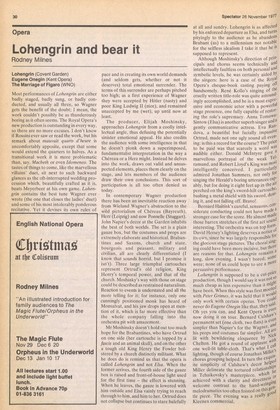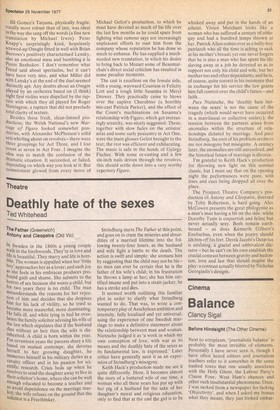Opera
Lohengrin and bear it
Rodney Milnes
Lohengrin (Covent Garden) Eugene One& (Kent Opera) The Marriage of Figaro (WNO) Most performances of Lohengrin are either badly staged, badly sung, or badly conducted, and usually all three, so Wagner gets the benefit of the doubt; I mean, the work couldn't possibly be as thunderously boring as it often seems. The Royal Opera's new production is outstanding in every way, so there are no more excuses. I don't know if Rossini ever saw or read the work, but his remark about mauvais quarts d'heure is uncomfortably apposite, except that some would extend the quarters to halves. As a transitional work it is more problematic than, say, Macbeth or even Idomeneo. The tastes of things to come, like the marvellous villains' duet, sit next to such backward glances as the oft-interrupted wedding procession which, beautifully crafted as it is, beats Meyerbeer at his own game. Lohengrin contains the best tune Wagner ever wrote (the one that closes the ladies' duet) and some of his most intolerably ponderous recitative. Yet it devises its own rules of pace and in creating its own world demands (and seldom gets, whether or not it deserves) total emotional surrender. The terms of this surrender are perhaps pitched too high; as a first experience of Wagner they were accepted by Hitler (nasty) and poor King Ludwig Ii (nice), and remained unaccepted by me (wet), up until now at least.
The producer, Elijah Moshinsky, approaches Lohengrin from a coolly intellectual angle, thus defusing the potentially sinister emotional appeal. He also credits the audience with some intelligence in that he doesn't plonk down a superimposed, fundamentalist interpretation in the way a Chereau or a Herz might. Instead he delves into the work, draws out valid and unsuspected elements, places them clearly on the stage, and lets members of the audience draw their own conclusions. This sort of participation is all too often denied us today.
In contemporary Wagner production there has been an inevitable reaction away from Wieland Wagner's abstraction to the wild pictorialism of Chereau (Bayreuth), Herz (Leipzig) and now Ponnelle (Stuggart). John Napier's decor at the Garden inhabits the best of both worlds. The set is a plain gauze box, but the costumes and props are extremely elaborate and historical. Brabantines and Saxons, church and state, bourgeois and peasant, military and civilian, all are clearly differentiated (I know that sounds horrid, but I promise it isn't). Three large triumphal cartouches represent Ortrud's old religion, King Henry's temporal power, and that of the church. Moshinky's way with those on stage could be described as restrained naturalism. Reaction to events is understated and all the more telling for it; for instance, only one cunningly positioned monk has heard of Monsalvat, and his jaw drops open at mention of it, which is far more effective than the whole company falling into the orchestra pit with amazement.
Mr Moshinsky doesn't hold out too much hope for the Brabantines, who have Ortrud on one side (her cartouche is topped by a fascis and an animal skull), and on the other a tough old King Henry the Fowler bolstered by a church distinctly militant. What he does do is remind us that the opera is called Lohengrin and not Elsa. When the former arrives, the fourth side of the gauze box is raised and front-of-house light used for the first time — the effect is stunning. When he leaves, the gauze is lowered with him outside and Elsa vainly trying to reach through to him, and him to her. Ortrud does not collapse but continues to stare balefully at all and sundry. Lohengrin is as affected by his enforced departure as Elsa, and turns pityingly to the audience as he abandons Brabant (us) to a millennium not notable for the selfless idealism I take it that he is supposed to represent. Although Moshinsky's direction of principals and chorus seems technically and intellectually faultless on both personal and symbolic levels, he was certainly aided by the singers: here is a case of the Royal Opera's cheque-book casting paying off handsomely. Rene Kollo's singing of the cruelly written title-role was quite astound' ingly accomplished, and he is a most exPre; sstve and economic actor with a powerful stage presence, one fully capable of restoring the role's supremacy. Anna TomowaSmtow (Elsa) is another superb singer and a gently communicative actress. Eva Ran" dova, a beautiful but facially impassive Ortrud, made not one ugly sound all evening: is this a record for the course? The Price to be paid was that scarcely a word Was audible either. Donald McIntyre gave a marvellous portrayal of the weak Telramund, and Robert Lloyd's King was most intelligently conceived. I particularlY admired Jonathan Summers, not only for singing the Herald's boring utterances caP: ably, but for doing it eight feet up in the an perched on the king's sword-hilt cartouche, bashing a metal shield with his sword, dent" ing it, and not falling off. Bravo! Bernard Haitink's careful, sensuous, CO siderate conducting could not have made,a stronger case for the score. He almost inati'. those barren stretches of the first act sound interesting. The orchestra was on top foril); David Hersey's lighting deserves a notice 01 its own, since he was largely responsible fet the glorious stage pictures. The choral sing' ing could have been more incisive, but there are reasons for that. Lohengrin remains a long, slow evening. I wasn't bored; sof° were; none of us could hope to see a tonic persuasive performance. Lohengrin is supposed to be a cut-price production, though I would say it was not sot much cheap as less expensive than it mign, have been. When this style was first mo0teu1d with Peter Grimes, it was held that it w0I-1, only work with certain operas. You coiiliu never do Eugene Onegin like that, they saw' Oh yes you can, and Kent Opera is eve,a, now doing it on tour. Bernard Culshaw; permanent set (one cloth, two flats) is eyed simpler than Napier's for the Wagner, 91/e his props and costumes far simple'. All. lit with bewildering eloquence by IN1I,c1, Chelton. He got a round of applause WI one well-lit table-cloth. That's what ea,s lighting, though of course Jonathan Miller„. chorus grouping helped. In turn the exclul'd ite simplicity of Culshaw's decor hers Miller delineate the tortured relationsinfe in Tehaikovsky's masterpiece, which achieved with a clarity and directness.il g welcome contrast to the hand-wringln, melodramatics too often foisted on this gc-A tie piece. The evening was a reallY gO Kleenex commercial. Jill Gomez's Tatyana, physically fragile, vocally more robust than of late, was ideal In the way she sang off the words (a fine new translation by Michael Irwin). Peter Knapp's surprisingly kind, hopelessly screwed-up Onegin fitted in well with Brian Burrows's positively characterised Lensky, also an emotional mess and bumbling a la Pierre Bezhukov. I don't remember what Freud said about spectacles, but it can't have been very nice, and what Miller did With Lensky's at the end of the duel seemed distinctly apt. Any doubts about an Onegin Played by an orchestra based on (I think) eight first violins were dispelled by the rapture with which they all played for Roger Norrington, a rapture that did not preclude total clarity of texture.
Besides these fresh, clean-limned productions, the Welsh National's new Marriage of Figaro looked somewhat ponderous, with Alexander McPherson's solid sets whirling about on revolves — there were three groupings for Act Three, and I lost Fount at seven in Act Four. I imagine the Idea was to match the confusion of the dramatic situation. It succeeded, or failed, depending on which way you look at it. But commitment glowed from every move of Michael Geliot's production, to which he must have devoted as much of his life over the last few months as he could spare from fighting what rumour says are increasingly unpleasant efforts to oust him from the company whose reputation he has done so much to enhance. He has supplied a muchneeded new translation, in which his desire to bring back to Mozart some of Beaumarchais's direct social criticism has resulted in some peculiar moments.
The cast is excellent on the female side, with a young, wayward Countess in Felicity Lott and a tough little Susanna in Meryl Drawer. They practically came to blows over the captive Cherubino (a horribly mis-cast Patricia Parker), and the effect of the Count's machinations on Susanna's relationship with Figaro, which got increasingly scratchy, was nicely suggested. These, together with slow fades on the artistos' arias and some surly pea'santry in Act One, were the Main glosses Geliot brought to the text; the rest was efficient and exhilarating. The music is safe in the hands of Gyiirgy Fischer. With some re-casting and a few six-inch nails driven through the revolves, this should settle down into a very worthy repertory Figaro,







































 Previous page
Previous page